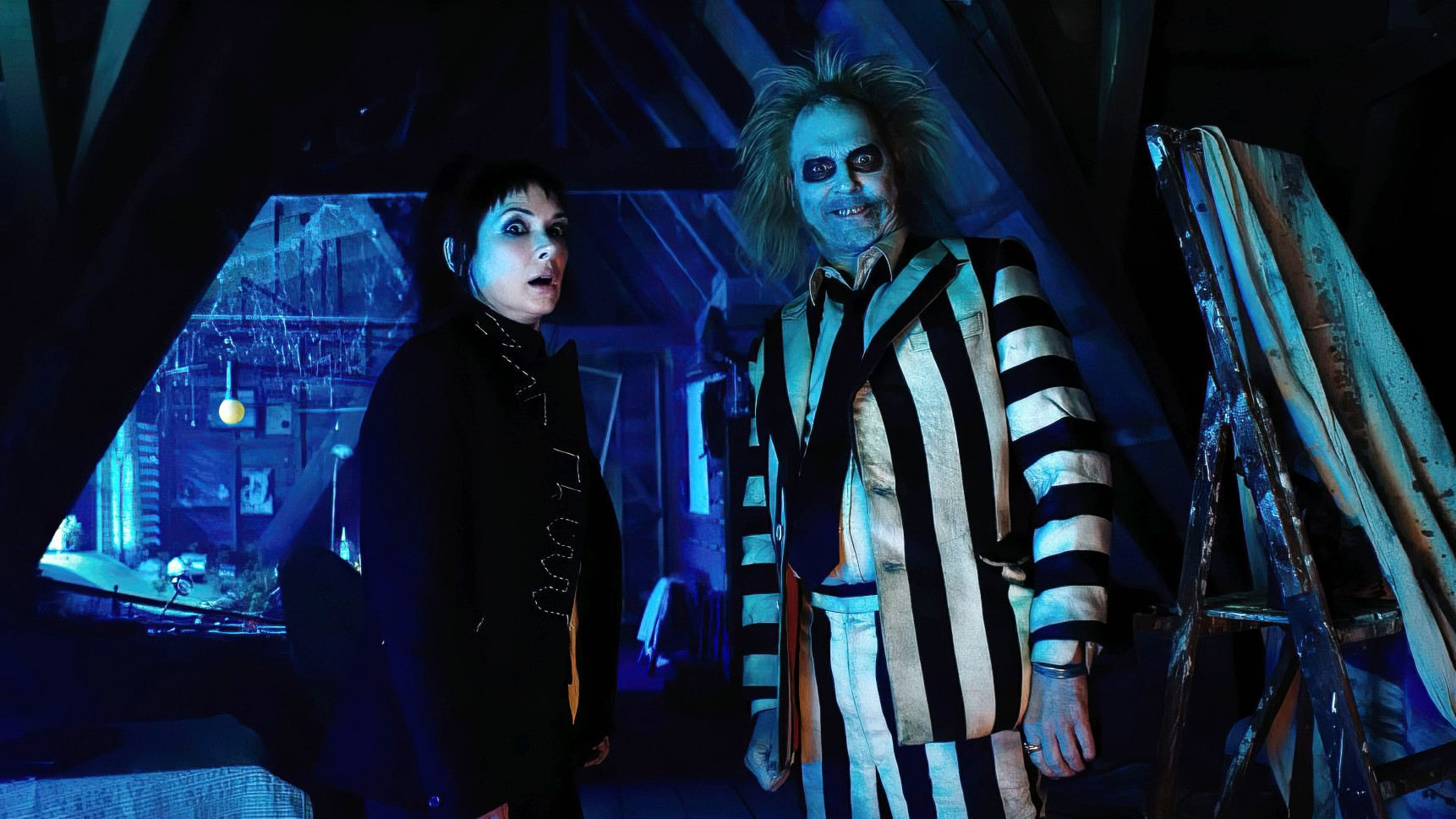Beetlejuice Beetlejuice: pure 'nostalgia bait'
Michael Keaton and Winona Ryder return for sequel to the 1988 cult classic

A free daily email with the biggest news stories of the day – and the best features from TheWeek.com
You are now subscribed
Your newsletter sign-up was successful
"Hollywood has a history of reanimating the decaying corpses of long-dead movies", so it was perhaps "just a matter of time before somebody delved into the grave marked Beetlejuice", said Wendy Ide in The Observer.
Tim Burton made his name with the original, and he has also directed this "belated sequel" – and it's not bad at all.
Rocking "exactly the same haunted Victorian doll wardrobe" as she did in the first film, Winona Ryder reprises her role as Lydia Deetz, now a widow and distant mother to rebellious teenager Astrid (Jenna Ortega). Also returning from the original cast are Catherine O'Hara (as Lydia's stepmother) and Michael Keaton, as the titular prankster-demon-"bio-exorcist".
The Week
Escape your echo chamber. Get the facts behind the news, plus analysis from multiple perspectives.

Sign up for The Week's Free Newsletters
From our morning news briefing to a weekly Good News Newsletter, get the best of The Week delivered directly to your inbox.
From our morning news briefing to a weekly Good News Newsletter, get the best of The Week delivered directly to your inbox.
'Pleasingly idiosyncratic'
There is a sense that "decades-old ideas have been dusted off, dressed up a little and passed off as new", but what redeems the film is the fact "that those ideas were so wigged out and distinctive in the first place".
Sure, "Beetlejuice Beetlejuice is derivative, but it's also pleasingly idiosyncratic", and though it can't match the cult appeal of the original, "it has a lot of fun trying".
'Lacking coherence'
I'm afraid I found the whole thing "messy and tiresome", said Robbie Collin in The Daily Telegraph. This unnecessary sequel is pure "nostalgia bait", and throughout, you can "hear the writers cackling and high-fiving each other as they crowbar in favourite details" from the original, regardless of whether their inclusion makes any sense.
"Beetlejuice Beetlejuice" is, alas, mediocre mediocre, agreed Brian Viner in the Daily Mail. Burton has some fun with the "great hereafter"; it lasts a "sensible hour and 45 minutes", and boasts a lively retro soundtrack. But it "lacks coherence"; it often feels like no more than an "assembly of random macabre ideas from Burton's undeniably fertile mind".
A free daily email with the biggest news stories of the day – and the best features from TheWeek.com
-
 Local elections 2026: where are they and who is expected to win?
Local elections 2026: where are they and who is expected to win?The Explainer Labour is braced for heavy losses and U-turn on postponing some council elections hasn’t helped the party’s prospects
-
 6 of the world’s most accessible destinations
6 of the world’s most accessible destinationsThe Week Recommends Experience all of Berlin, Singapore and Sydney
-
 How the FCC’s ‘equal time’ rule works
How the FCC’s ‘equal time’ rule worksIn the Spotlight The law is at the heart of the Colbert-CBS conflict
-
 Bad Bunny’s Super Bowl: A win for unity
Bad Bunny’s Super Bowl: A win for unityFeature The global superstar's halftime show was a celebration for everyone to enjoy
-
 Book reviews: ‘Bonfire of the Murdochs’ and ‘The Typewriter and the Guillotine’
Book reviews: ‘Bonfire of the Murdochs’ and ‘The Typewriter and the Guillotine’Feature New insights into the Murdoch family’s turmoil and a renowned journalist’s time in pre-World War II Paris
-
 6 exquisite homes with vast acreage
6 exquisite homes with vast acreageFeature Featuring an off-the-grid contemporary home in New Mexico and lakefront farmhouse in Massachusetts
-
 Film reviews: ‘Wuthering Heights,’ ‘Good Luck, Have Fun, Don’t Die,’ and ‘Sirat’
Film reviews: ‘Wuthering Heights,’ ‘Good Luck, Have Fun, Don’t Die,’ and ‘Sirat’Feature An inconvenient love torments a would-be couple, a gonzo time traveler seeks to save humanity from AI, and a father’s desperate search goes deeply sideways
-
 A thrilling foodie city in northern Japan
A thrilling foodie city in northern JapanThe Week Recommends The food scene here is ‘unspoilt’ and ‘fun’
-
 Tourangelle-style pork with prunes recipe
Tourangelle-style pork with prunes recipeThe Week Recommends This traditional, rustic dish is a French classic
-
 Samurai: a ‘blockbuster’ display of Japan’s legendary warriors
Samurai: a ‘blockbuster’ display of Japan’s legendary warriorsThe Week Recommends British Museum show offers a ‘scintillating journey’ through ‘a world of gore, power and artistic beauty’
-
 BMW iX3: a ‘revolution’ for the German car brand
BMW iX3: a ‘revolution’ for the German car brandThe Week Recommends The electric SUV promises a ‘great balance between ride comfort and driving fun’